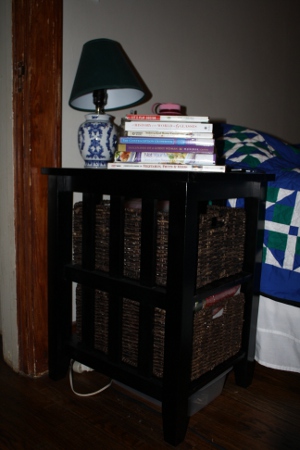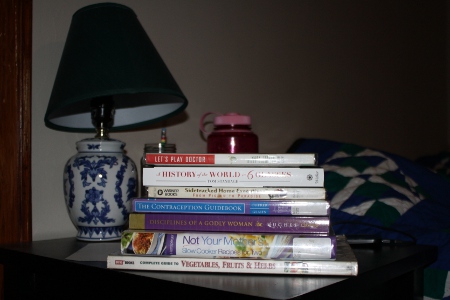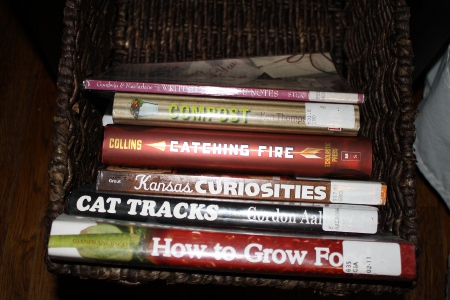I really expected I would be on time with this Nightstand post. After all, I’d have the whole Memorial Day weekend to work on it since I’d have Monday off and no family in town to barbecue with.
What I hadn’t expected was that Daniel and I would lead a team from our church down to Moore, Oklahoma on Sunday to help out with relief efforts.
Between preparing, going, and recovering, that took half of my weekend–and I still had the normal stuff to do (help some friends move, sewing with a friend, grocery shopping, getting the compost into my garden finally).
Thus, a hastily written and photo-free nightstand post. My apologies.
This month, I read:
- Fledgling and Painter and Ugly by Robert Blake
When I moved, I decided I’d revise my “Read Every Book” plan to say that once I’d “closed” a category at one library, I was done with that category and wouldn’t have to catch up any unread books from that category at the next library. Which meant that I was already done with picture books through author last name BLAKE, Q. I had read all but two of the Wichita Public Library’s books by Robert Blake–and read these last two in the last month to finish up all the BLAKE picture books. - The Contraception Guidebook: Options, Risks, and Answers for Christian Couples by William Cutrer
This was an excellent review of the available contraceptives from a pro-life, pro-family (although still pro-contraceptive) viewpoint. I intend to review this in more depth at some point soon here, but my intentions sometimes end up going awry. - A Year of Biblical Womanhood by Rachel Held Evans (reviewed here)
One of those uber-controversial Christian books that I waited to read until most of the buzz died down. I found that I enjoyed Evans’ experiences trying to follow the Bible’s directives to women as literally as possible–but agreed with many of her critics that her Biblical interpretations are suspect and her treatment of the complementarian movement often unfair. Check out my review for details–and a fair number of quotes. - Not Your Mother’s Slow Cooker Recipes for Two by Beth Hensperger
There were quite a few interesting recipes in this one–and I liked the three recipes I tried (Red Curry Chicken braised in Coconut Milk, Pork Chops with Turnips and Apples, and Vegetable Chili con Carne). I did find that the recipes made more than just two servings–but that might have been related to my propensity for using larger vegetables than recipes call for (is it just me, or do Midwestern vegetables grow larger than recipe-sized vegetables? Whenever recipes say “1 medium onion or 1/2 cup chopped onion” I end up with a cup of chopped onion from what I thought was a medium onion.) - Let’s Play Doctor by Mark Leyner and Billy Goldberg
I enjoyed the random medical/physiological information found in Leyner and Goldberg’s Why do Men have nipples? and Why do Men fall Asleep after Sex? (In my memory, neither are actually as sex focused as they sound). So, when I saw Let’s Play Doctor at my new local library, I grabbed it. I was less than enthused. There was some information to be found here, but it was mostly silliness in the form of ridiculous multiple choice questions the reader is supposed to answer in their quest to get a fake medical degree from the “Why Do Men Have Nipples School of Medicine”. Worth Skipping. - A History of the World in 6 Glasses by Tom Standage (reviewed here)
Standage tells the history of the world–through the lens of six beverages that dominated the world stage during different ages: beer, wine, spirits, coffee, tea, and Coca-Cola. I thoroughly enjoyed this topical history of the world. - The Picture of Dorian Gray by Oscar Wilde
I’m leading the Reading to Know Book Club‘s discussion of this title in October–which is still a ways off, but considering how slowly I’ve been reading lately, I decided to start early. I chose to read without taking notes this first time around–but I’ll probably be re-reading and making notes in September. It’s not too early for you to start thinking about joining us in October too! - Sidetracked Home Executives: From Pigpen to Paradise by Pam Young and Peggy Jones
I enjoyed reading this and think the general concept is pretty good (although there’s no way I have time to do certain chores as frequently as they recommend.) I’ve adapted their 3×5 card file system to my to-do app on my phone–but am implementing on a step-wise basis. I’m still unpacking and rearranging our home–so I’m not quite ready to start thinking about things like regularly cleaning the mini-blinds or the ceiling fan. But someday–and when that day comes, I’ve got everything in my phone ready to implement.
Currently in progress:
- The 5:30 Challenge: 5 ingredients, 30 minutes, dinner on the table by Jeanne Besser
- While the Clock Ticked by Franklin Dixon
- The Thyroid Sourcebook for Women by Sara Rosenthal
Don’t forget to drop by 5 Minutes 4 Books to see what others are reading this month!








